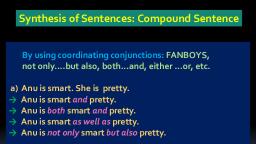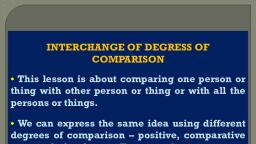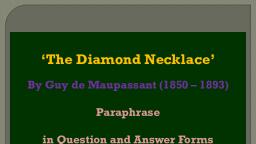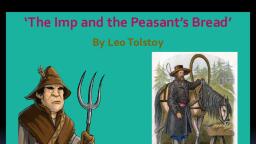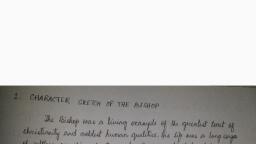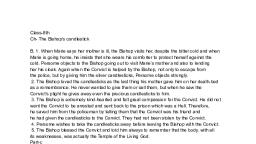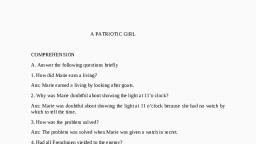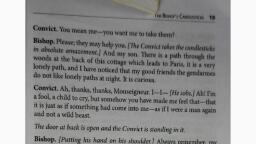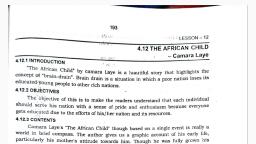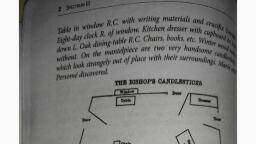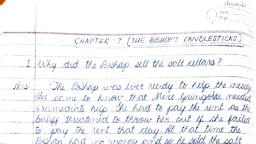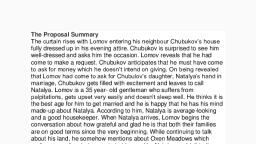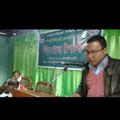Page 1 :
‘The Bishop’s Candlesticks’, By Norman Mckinnel, Paraphrase, in Question & Answer Form
Page 2 :
Theme of the Play:, , A criminal is not born a criminal. It is often, circumstances that turn a person into a criminal. Only, real love and kindness, and not punishment or ill, treatment, can reform a hard-hearted criminal.
Page 3 :
1. Describe the opening scene of the play “The Bishop’s, Candlesticks”., , The play opens with a scene in the kitchen of the Bishop’s, cottage with Marie stirring some soup on the fire and, Persome laying the cloth, etc. They are engaged in, conversation about the soup being boiled for supper foe the, Bishop.
Page 4 :
2. “Don’t keep saying ‘Yes, Madam’ like a parrot,, nincompoop”., Why was Persome rude to Marie, the maid servant?, Persome found Marie irritating when she kept saying, nothing more than ‘Yes, Madam’ or ‘No, Madam’., Moreover, being a practical woman, she treated a, servant as a servant without any emotional, attachment.
Page 5 :
3. Why did Marie give bland responses when Persome, enquired her about the Bishop’s whereabouts?, Marie knew that Persome, a practical woman, was, protective of her brother, the Bishop. If she came to know, the truth that her brother had gone out to pray for her sick, mother, she would not take it lightly. Therefore, she tried to, avoid telling the truth.
Page 6 :
4. How did Persome react when she was told that the, salt cellars had been sold?, She was shocked that a few of the family’s possessions, that she highly regarded of had gone out of the family., She could not believe that her brother would go this far, to help the liars and the pretenders. She believed that, her brother was so simple and kind that the people, exploited him.
Page 7 :
5. Why did the Bishop have the salt cellars sold?, He had them sold for money so that he could help pay, the house rent for Mere Gringoir. She was an old, woman living atop a hill, bedridden and unable to pay, her house rent. She had to pay the rent that day itself., Otherwise she would be turned out of her house by the, bailiff.
Page 8 :
6. “Oh, mon Dieu! It is hopeless, hopeless. We shall, have nothing left”., Why did Persome not approve of her brother’s, philanthropic/charitable activities?, Persome was a typical practical woman who believed, that charity begins at home. She was aware that her, brother, though a Bishop, was financially unsound, and, as such she wanted him to think for his wellbeing first., He had sold off his estate and most of his belongings,, and now the salt cellars too were gone.
Page 9 :
7. Why did the Bishop give his comforter to Marie, his, maid servant?, It was late at night. It was extremely cold outside, and, Marie was going home to be with her mother, who was, unwell. The Bishop, who had just got in, felt pity for, Marie. Therefore, he gave his comforter to Marie, who, could use it to ward off the cold.
Page 10 :
8. Why did Persome not believe that Marie’s mother was, unwell?, She was very protective of her brother, the Bishop. In her, opinion, the poor and needy people were actually lazy and, pretenders. They pretended to be ill just to have the Bishop, call on them. They had no feelings for him. Thus, they took, advantage of his simplicity and nobility.
Page 11 :
9. Compare and contrast Persome with her brother, the, Bishop., , Persome was a typical practical woman who was, materialistic and believed that charity begins at home. She, had no soft corner for the people in distress. In her opinion,, they were lazy and pretenders and they took undue, advantage of her brother’s simplicity and nobility. On the, other hand, the Bishop was kind, compassionate and, charitable. True to his calling, he lived for others and not for, himself. He had done so much for the poor and the needy,, and yet he felt that he could do so little. Though poor, he, was always ready to help the distressed people. Therefore,, he always kept the doors and windows of his cottage open.
Page 12 :
10. “If people lie to me they are poorer, not I”. Explain., For the Bishop it made no difference even if people lied to, him. He believed that they lied to him out of their distress., Therefore, being kind-hearted and compassionate, he, always helped anyone who came to him for help – including, liars and criminals.
Page 13 :
11. What did Persome say when the Bishop talked about, suffering being “so much in the world” and he could “do so, little”?, , She said that he always thought for the suffering of other, people but not of the people who loved him best – her, suffering. She suffered for him because he lived for others, and not for himself. She had tried to reason with him that, he had to think for his wellbeing first but he acted more like, a child or a fool and broke her heart.
Page 14 :
12. Why did the Bishop not want to sell his candlesticks?, He did not want to sell them because they were a gift from, his mother on deathbed. She had asked him to keep them in, her memory. But at the same time he was at a loss thinking, whether it was a sin to get too attached to them.
Page 15 :
13. How did the Bishop react when the convict seized him, from behind and threatened to kill him at the point of a, knife?, , It was past midnight when the incident occurred. The, Bishop was about to read before he retired for the night., Suddenly the convict seized him from behind at the point of, his knife, threatening to kill him if he raised an alarm. But, the Bishop was unflustered. Instead, calling him friend, he, asked him if he could help him in any way.
Page 16 :
14. “I’m too old a bird to be caught with chaff”. Explain., The convict meant that he could not be easily deceived as, he was well familiar with the ways of the world. When the, Bishop told him that he would go inside to bring the keys to, give him food, he thought that he was up to some trick – to, alarm the family, catch him and hand him over to the police.
Page 17 :
15. Why did the convict break into the Bishop’s cottage?, He had escaped from prison after ten years in confinement., He was indeed free but free to starve as he had no means of, living. He even stole the clothes that he was wearing. With, the police looking for him, he could neither go for work nor, to beg. Therefore, he broke into the Bishop’s cottage to, steal food.
Page 18 :
16. “You have your soul to lose, my son; it is of more value, than my heart”. Explain., The Bishop made this remark when the convict threatened, to knife his heart if he played him false. Through this, remark, the Bishop wanted to tell him that his soul was, more valuable than his own heart. If he lost his soul, he, would lose his entire human entity., , Next: Part 2




